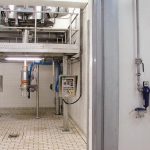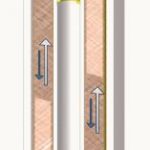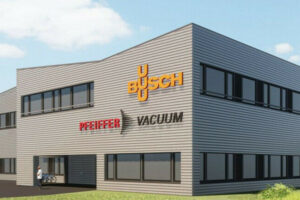Taste professionals in the modern fragrances and flavours industry make every effort to please the palate or the sense of smell. The demands placed on quality and hygienic safety in the production of aroma substances are accordingly high. Compressed air can be of crucial importance for production.
Jeannette Garre
In 1874, in the German town of Holzminden, Wilhelm Haarmann and Ferdinand Tiemann were the first to successfully synthesise vanillin from the cambial sap of coniferous wood. This discovery soon led to the establishment of a company, Haarmann & Reimer, and to the start of industrial vanillin production. Today, the company – which merged with Dragoco to become Symrise – ranks among the foremost manufacturers of fragrances and flavours worldwide. From the original vanillin, the business has grown to comprise four broad-based divisions: flavours, fragrances, cosmetics and aroma chemicals.
Stringent hygienic requirements
There is one medium that is of crucial importance for the production of all aroma chemicals: compressed air. At Symrise, for example, powdery substances are produced batchwise in powder mixers with a capacity of some 2000 l. During this process, the shaft bearings of the mixer drive have to be protected against the extremely fine aroma powder to ensure that it cannot penetrate and block up the system. The shaft bearings are therefore provided with an air barrier slightly above atmospheric pressure. However, this mechanical arrangement must also satisfy hygienic requirements. Since the compressed air applied to the shaft bearings necessarily comes into contact with the aroma powder, it needs to be virtually sterile as well as dry and free from foreign matter. This was a major problem until about three years ago in the company’s Chinese plant in Shanghai. Here, the temperatures can reach 40 °C with a relative air humidity of up to 90 %. Under these conditions, conventional treatment using adsorption dryers proved to be inadequate in several respects. At the same time, these extreme temperature and humidity conditions were characterised by great variations. Accordingly, the actual drying performance of the adsorption dryers, i.e. the humidity of the compressed air, was always an unpredictable production factor. The implementation of reliable quality assurance procedures and optimum protection of the shaft bearings were therefore a challenge that sometimes seemed almost insurmountable. Another problem was abraded desiccant matter entrained in the compressed air. There was a risk that this abraded matter would become stuck to the food-standard grease used on the shafts. The resulting abrasive paste would greatly reduce the lifetime of the shaft bearings. It was not even possible to guarantee that abraded matter wouldn’t get into the mixing zone and thus into contact with the aroma powder.
Membrane dryer
A comprehensive solution was eventually worked out together with Beko Technologies. Beko recommended compressed-air treatment using Drypoint M membrane dryers. The Drypoint M membrane dryer dries the compressed air on the basis of the physical principle of diffusion through a partially permeable membrane. The device essentially consists of a compact, highly efficient module with a membrane layer on the inside of numerous hollow fibres. Moist compressed air flows through these hollow fibres in a longitudinal direction. In order to provide a driving force for diffusion, it is necessary to establish a partial pressure gradient of water vapour between the inside and outside of the membrane. For this purpose, part of the compressed air is diverted, expanded and conveyed as a countercurrent, referred to as purge air, along the membrane outside. Due to its expansion, the purge air is much drier than the air inside the module. Moisture from the compressed air diffuses through the membrane into the purge air and the moisture-laden purge air is then discharged from the module into the environment. As a result, the membrane dryer does not produce any condensate as an undesirable by-product.
The Drypoint M membrane dryer has even more positive characteristics: the modules require absolutely no maintenance, they are very quiet and do not consume any electricity. Besides being independent from the electricity supply, the dryers take up very little space so that they are quite easy to incorporate into existing facilities. The devices are suitable for a broad range of applications. They can be used for systems with very low compressed air consumption through to systems with more complex requirements. Integration into a compressed-air network with centralized treatment is just as easy as installation directly upstream of a separate point of use.
Successful aroma therapy
Compared with adsorption dryers, Drypoint M membrane dryers lower the pres-sure dew point by a constant value and can therefore ensure unvarying relative humidity. This factor was particularly appreciated by the Symrise engineers in view of the fluctuating temperature and humidity lev-els in the Shanghai district. Almost incidentally, Drypoint M membrane dryers were able to solve another problem of the Shanghai plant. The production range also includes liquid aroma chemicals with a number of highly flammable components. For safety reasons, explosion-protection regulations are applied to the entire production area. The interiors of the switch cabinets of the fully automatic dosing equipment for the liquid aroma substances are supplied with compressed air, in order to prevent corrosion of the contacts under the prevailing difficult ambient conditions. In this sensitive sector Drypoint M membrane dryers – which function without electricity – are now used to treat the compressed air instead of adsorption dryers.
Hall 27, Booth A19
cpp 430
Information on Drypoint M
Symrise aroma chemicals
Compressed air calculator
Share:









